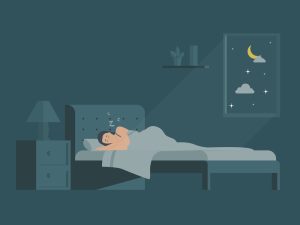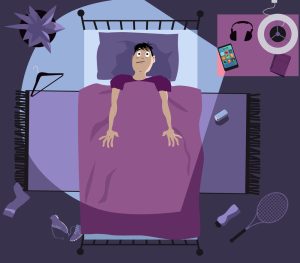Hypnosis is helpful with many subconscious issues ranging from phobias and fears to reducing anxiety and bad habits. It is also helpful with sleep. Clinical Hypnotherapy can help individuals find the relaxation and subconscious block that may be preventing them from a good night’s rest. Those with sleep issues may have multiple issues but many of the issues are psychological. Hypnosis can uncover the subconscious culprit for lack of sleep and also help one find it easier to fall asleep.

The article, “How Does Sleep Hypnosis Work and Can It Improve Your Sleep?” by Ana Diaz looks closer at the benefits of hypnosis is helping one find a better night’s sleep. She states,
“The goal of sleep hypnosis isn’t to induce sleep during the session. Instead, it focuses on changing any negative sleep habits or thoughts you may have. This process intends to improve your sleep quality after the hypnosis session. Your provider may recommend that you try sleep hypnosis along with other treatments. A common approach is to combine sleep hypnosis with cognitive behavioral therapy for insomnia (CBT-I). This method involves reframing thoughts, emotions, and behaviors contributing to sleep difficulties. Sleep hypnosis also encourages the adoption of healthier sleep habits by promoting better sleep hygiene.”
“How Does Sleep Hypnosis Work and Can It Improve Your Sleep?”. Diaz, A. (2023). HealthNews. Access here
Commentary
In today’s fast-paced world, getting a good night’s sleep can be a challenge. Many of us struggle with racing thoughts and restlessness, making it difficult to relax and fall asleep. That’s where guided sleep hypnosis comes in. Guided sleep hypnosis is a technique that combines relaxation and visualization to help you achieve a deep and restful sleep. In this article, we will explore the benefits of guided sleep hypnosis and how it can improve your sleep quality.
Understanding the Science Behind Guided Sleep Hypnosis
To understand the benefits of guided sleep hypnosis, it’s important to have a basic understanding of how it works. Guided sleep hypnosis is based on the principles of hypnosis, which is a state of focused attention and relaxation. During a guided sleep hypnosis session, a trained hypnotherapist or a pre-recorded audio guide will use soothing language and imagery to guide you into a state of deep relaxation. This relaxation helps to quiet the mind and release stress, allowing you to enter a state of deep sleep more easily.
Research has shown that guided sleep hypnosis can have a positive impact on sleep quality. A study published in the Journal of Clinical Sleep Medicine found that participants who listened to a guided sleep hypnosis audio experienced improved sleep quality and reduced insomnia symptoms. This suggests that guided sleep hypnosis can be an effective tool for those struggling with sleep disorders or insomnia.
Benefits of Guided Sleep Hypnosis for a Restful Night’s Sleep
One of the primary benefits of guided sleep hypnosis is its ability to induce a state of deep relaxation. As you listen to the soothing voice guiding you through the session, your body and mind begin to unwind, releasing tension and promoting a sense of calm. This relaxation not only helps you fall asleep faster but also improves the quality of your sleep. When you are in a deep state of relaxation, your body is better able to repair and rejuvenate itself during the night, leading to a more restful sleep experience.
Another benefit of guided sleep hypnosis is its ability to reduce anxiety and stress. Many of us carry the weight of the day’s stress and worries to bed, making it difficult to switch off and relax. Guided sleep hypnosis helps to quiet the mind and release the negative thoughts and emotions that can keep us awake at night. By focusing on positive affirmations and calming imagery, guided sleep hypnosis can help alleviate anxiety and promote a sense of peace and tranquility.
Additionally, guided sleep hypnosis can be a valuable tool for those struggling with insomnia. Insomnia is a common sleep disorder characterized by difficulty falling asleep or staying asleep. Guided sleep hypnosis can help break the cycle of insomnia by promoting relaxation and reducing anxiety. By training the mind to enter a state of deep relaxation, guided sleep hypnosis can help reset your sleep patterns and promote a healthy sleep-wake cycle.
How Guided Sleep Hypnosis Works
Guided sleep hypnosis works by guiding your mind into a state of deep relaxation and focus. During a guided sleep hypnosis session, you will be guided through a series of relaxation techniques, such as deep breathing and progressive muscle relaxation. These techniques help to relax your body and quiet your mind, preparing you for a restful night’s sleep.
The guided portion of the session involves visualization and positive affirmations. As you listen to the soothing voice, you will be guided to imagine yourself in a peaceful and serene setting, such as a beach or a meadow. This visualization helps to distract your mind from racing thoughts and worries, allowing you to enter a state of deep relaxation.
Throughout the session, the voice will also provide positive affirmations related to sleep and relaxation. These affirmations help to reprogram your subconscious mind and promote positive sleep habits. By reinforcing positive beliefs and attitudes towards sleep, guided sleep hypnosis can help you overcome insomnia and improve your sleep quality.
Different Types of Guided Sleep Hypnosis Techniques
There are various types of guided sleep hypnosis techniques that you can explore to find the one that works best for you. Some popular techniques include:
- Progressive Muscle Relaxation: This technique involves systematically tensing and relaxing different muscle groups to promote deep relaxation.
- Guided Imagery: This technique uses visualization to create a calming and peaceful mental image, helping to quiet the mind and induce sleep.
- Self-Hypnosis: With self-hypnosis, you can learn to guide yourself into a state of relaxation and sleep using techniques such as deep breathing and positive affirmations.
- Binaural Beats: Binaural beats are audio frequencies that can help synchronize the brainwaves and induce a state of relaxation and sleep.
Finding the Right Guided Sleep Hypnosis Program for You
When it comes to finding the right guided sleep hypnosis program for you, it’s important to consider your individual needs and preferences. There are many resources available, including books, online programs, and mobile apps, that offer guided sleep hypnosis sessions. It’s a good idea to read reviews and listen to sample sessions to get a sense of the style and effectiveness of the program.
You may also want to consider working with a trained hypnotherapist who can tailor the sessions to your specific needs. A hypnotherapist can help guide you through the process and provide personalized support and guidance.
Tips for Practicing Guided Sleep Hypnosis Effectively

To get the most out of your guided sleep hypnosis practice, here are some tips to keep in mind:
- Create a relaxing sleep environment: Make sure your bedroom is dark, quiet, and at a comfortable temperature to promote a restful sleep environment.
- Stick to a regular sleep schedule: Try to go to bed and wake up at the same time every day to establish a consistent sleep routine.
- Limit screen time before bed: The blue light emitted by electronic devices can interfere with sleep. Avoid using screens at least an hour before bed.
- Practice deep breathing: Deep breathing can help calm the mind and relax the body. Before starting your guided sleep hypnosis session, take a few moments to focus on your breath.
- Be patient and consistent: It may take some time for your body and mind to adjust to the practice of guided sleep hypnosis. Be patient and consistent with your practice, and you will begin to see the benefits over time.
Frequently Asked Questions About Guided Sleep Hypnosis
- Is guided sleep hypnosis safe? Yes, guided sleep hypnosis is generally considered safe. However, it is important to choose reputable sources and follow the instructions carefully.
- Can guided sleep hypnosis cure insomnia? Guided sleep hypnosis can be an effective tool for managing and reducing insomnia symptoms. However, it is not a cure-all and may not work for everyone.
- How long does it take to see results from guided sleep hypnosis? The time it takes to see results from guided sleep hypnosis can vary from person to person. Some people may notice improvements after just a few sessions, while others may take longer to experience the benefits.
- Can I practice guided sleep hypnosis on my own? Yes, you can practice guided sleep hypnosis on your own using pre-recorded audio guides or mobile apps. However, if you have a specific sleep disorder or underlying medical condition, it is recommended to seek guidance from a trained hypnotherapist.
Success Stories and Testimonials from Users of Guided Sleep Hypnosis
Many individuals have reported positive experiences with guided sleep hypnosis. Here are a few success stories and testimonials from users:
- “After struggling with insomnia for years, I decided to give guided sleep hypnosis a try. I was amazed at how quickly I started to notice improvements in my sleep quality. Now I fall asleep faster and wake up feeling more refreshed and energized.”
- “Guided sleep hypnosis has been a game-changer for me. I used to toss and turn for hours before falling asleep, but now I can easily relax and drift off to sleep. It has made a world of difference in my overall well-being.”
- “I was skeptical at first, but guided sleep hypnosis has been a lifesaver for me. It helps me quiet my mind and let go of the stress and worries of the day. I now look forward to bedtime knowing that I will have a peaceful and restful night’s sleep.”
Conclusion: Embracing the Benefits of Guided Sleep Hypnosis for a Better Sleep Experience

In conclusion, guided sleep hypnosis is a powerful tool for achieving a restful night’s sleep. By promoting relaxation, reducing anxiety, and reprogramming the mind for positive sleep habits, guided sleep hypnosis can help improve sleep quality and overall well-being. Whether you choose to practice guided sleep hypnosis on your own or seek guidance from a trained hypnotherapist, embracing this technique can lead to a more restful and rejuvenating sleep experience. So why not give it a try and discover the benefits of guided sleep hypnosis for yourself?
If you would like to learn more about sleep hypnosis or learn how to help others utilize hypnosis for a variety of reasons beyond just sleep, then please review AIHCP’s Clinical Hypnotherapy Certification and see if it matches your academic and professional goals. The program is online and independent study and open to qualified professionals seeking a certification in Clinical Hypnotherapy.
Additional Resources
“Sleep Hypnosis for Insomnia”. Collins, S. (2021). WebMD. Access here
“Self Hypnosis For Sleep: What It Is and How To Do It”. Harley, J. (2020). Mindset Health. Access here
“Sleep Disorders”. Mayo Clinic. Access here
“Sleep Disorders”. Pacheco, D. (2022). Sleep Foundation. Access here
